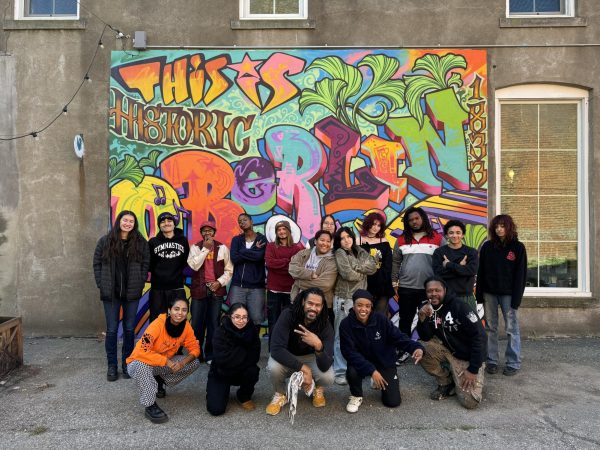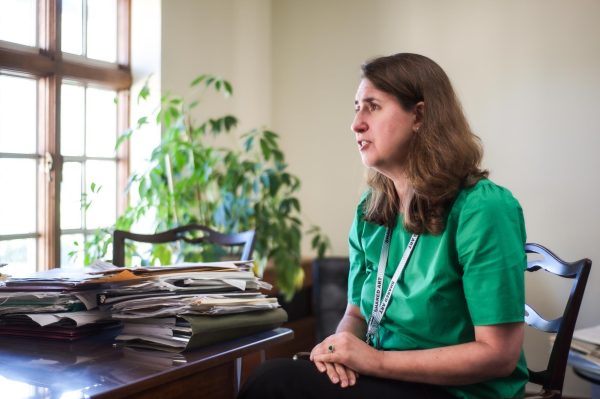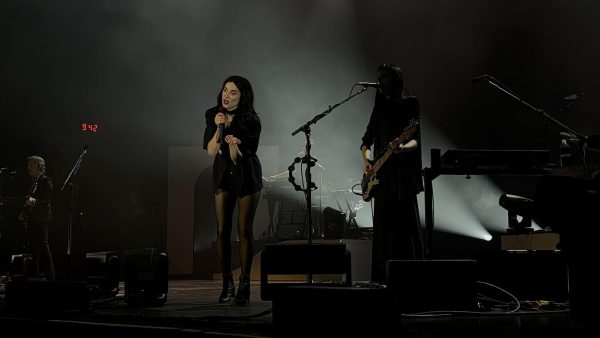Fairchild Chapel Welcomes Cellist, Composer, Teacher Tomeka Reid
Tomeka Reid is a Chicago-based jazz cellist whose improvisatory style sits between — and beyond — jazz and classical music. With her debut album Tomeka Reid Quartet available from Thirsty Ear Recordings, she displays her trademark penchant for novelly introducing the cello into musical spaces where the instrument is not typically featured. The quartet, featuring Reid on cello, Jason Roebke on bass, Mary Halvorson on guitar, and Tomas Fujiwara on drums, will take the stage in Fairchild Chapel at 8 p.m. tonight. The Foster/Bennett Duo, a saxophone and percussion duo from New York, will open the show.
“Everyone in that group is just such a sick musician, improvisor, and composer,” College senior Danilo Powell-Lima, an organizer for the event and member of the Modern Music Guild, wrote in an email to the Review. “It’s really a supergroup of the bosses in the field.”
Reid is also an esteemed composer, having been commissioned by the Chicago Jazz Festival and the Chicago Jazz Ensemble. Several reputed publications such as The New York Times and The Chicago Tribune have also taken notice of her — the Times refers to her as “a New Jazz Power Source.”
Reid received her Bachelor of Music from the University of Maryland, College Park, and her master’s degree in Music from DePaul University. Beyond her spectacular skill, Reid is also celebrated for her work as an educator. She spent seven years teaching middle and high school orchestra at the University of Chicago Laboratory Schools, and taught string improvisation workshops in the U.S. and Italy. In addition to the Chicago Jazz Ensemble, Reid also performed with the Association for the Advancement of Creative Musicians’ Great Black Music Ensemble, Dee Alexander’s Evolution Ensemble, Nicole Mitchell’s Black Earth Ensemble/Strings, and Mike Reed’s Loose Assembly, among others.
Reid’s quartet is a fan favorite among Conservatory students, particularly those interested in jazz, experimental, and improvisatory music.
“This quartet is definitely a more jazz-oriented group, … like an avant-garde jazz type of deal,” Conservatory senior Matthew Frerck said. “[There is] a lot of kinda swinging stuff, but it’s a little more adventurous than just a straight-ahead group. Mary Halvorson is a really creative guitarist. She does a lot and has really interesting and unique language on her instrument that no one else really has, [including] great textures.”
Double-degree junior Camie Vogley-Howes is one Oberlin student who follows Reid’s music. With a unique individual major in Jazz Performance on the violin, they are inspired by musicians Steff Smith and Lee Jenkins, as well as contemporary string players like Reid.
“There’s really so much to learn from Tomeka and other creative string players that are improvising and playing in a non-European, classical context,” Vogley-Howes said. “I found there to be a legacy of string players who perform improvisational music, [but] I’ve had to find them on my own because they don’t teach about them at Oberlin. I really wish that there was more acknowledgement of string players that contributed to improvisational styles.”
Reid is an inspiration for both Black and female musicians. Particularly since women, especially Black women, are less common in jazz and classical music ensembles, she is an important spokesperson and role model for these communities.
“I heard her debut album and loved it,” Powell-Lima said. “Then I saw her perform in New York City as part of this festival. She was leading this giant string septet [including] bass, drum, three violins, [and] two cellos, and the piece was dedicated to a Black man killed by law enforcement. I can’t remember who it was because this kind of thing happens all the time, but I was pretty moved by the piece and I was already interested in bringing her here.”
The Modern Music Guild, one of the longest running student organizations on Oberlin’s campus, is proud to present Tomeka Reid and her quartet. Bringing Reid to campus particularly illustrates the organization’s reach beyond Oberlin, as several fans from Cleveland and even Columbus plan to attend the performance.
“They have some of the most unique voices on their instruments,” Powell-Lima said. “They are doing a saxophone-percussion duo, but their take on that lineup is radically different from the history of those instruments. Writing about music is already hard, and what they do is insane, so you really are just going to have to be there.”
Tonight’s performance is free and open to the public.





